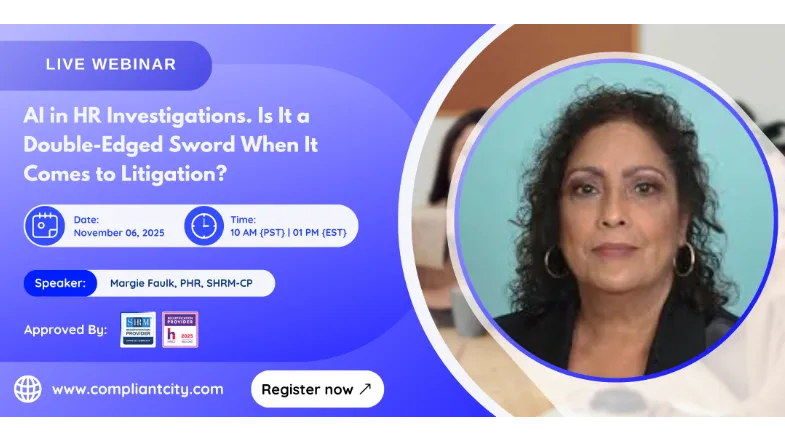AI in HR Investigations Is It a DoubleEdged Sword When It Comes to Litigation
The term “artificial intelligence” might be the phrase of 2025. It’s written and spoken about virtually everywhere by practically everyone, and it essentially markets itself as the newest, shiniest, and most efficient tool for every industry to consider and put into practice.
But the term “artificial intelligence” is quite broad. The definition of AI is broadened even further when considering that different technologies can be combined to create new AI systems. Despite the ever-expanding definition of AI, it is important to take inventory of the different types of AI to determine which, if any, is best suited for a workplace investigation.
How AI Can Help in Workplace Investigations
- Data management, analysis, and pattern recognition. Deploying AI in a workplace investigation can streamline an often long and intensive process by organizing, synthesizing, and digesting large amounts of data.
- Because AI tools are analyzing documents while sorting, an investigator can employ searches to identify information such as patterns, involved parties, and problematic documents, allowing for the creation of visual timelines of the event.
Compliance Considerations and Concerns with AI
- State laws, federal laws, and discrimination liability.
- Some states have started to enact legislation that regulates the use of AI in the workplace, many of which require consent by employees before deploying a program and require regular maintenance of the programs.
- In addition, the U.S. Equal Employment Opportunity Commission issued guidelines reinforcing the principle that investigators can be held liable for discrimination, even when it results from the use of AI.
Why Should You Attend:
Investigators using AI in employment investigations continue to expose themselves to liability under the Fair Labor Standards Act, Family and Medical Leave Act, and Employee Polygraph Protection Act, depending on the recommendation resulting from the investigation. Employers need to be aware of how they utilize AI in the workplace will determine their liability and litigation impact.
Areas that will be covered during the Session
- Learn what the AI impacts and concerns are by Employers in terms of liability
- Learn what the obstacles are when Employers and professionals use AI for onboarding, hiring, and performance reviews
- Learn how AI is used during investigations and how they are impacting the investigation process
- Learn what legal implications are when using AI for investigations, which can be an obstacle when using AI data for litigation purposes
- Learn how the Department of Labor (DOL) and the Fair Labor Standards Act (FLSA) will review the data submitted for
- Learn what tools will be instrumental when using AI in the workplace
- Learn how having the “Human Element” when using AI for investigations and other workplace compliance initiatives is mandatory when using AI in the workplace
- Learn what policies Employers need to have in place when using AI in the workplace
- Learn how informing employees that Employers use AI should be a mandatory process
Who Should Attend?
- All Employers
- Business Owners
- Company Leadership
- Compliance professionals
- HR Professionals
- Managers/Supervisors
After the live event, there will be a Q&A session where you can ask a question directly to our expert speaker. They will provide a clear and understandable response to help you better understand the topic.
Note: After completing your webinar purchase, please check your spam/junk folder in your email for the webinar joining link, which will be sent after the confirmation email.
Explore how AI is transforming HR investigations — from uncovering evidence to managing data — and the legal challenges it brings. Learn the benefits, risks, and compliance best practices to ensure fair, defensible investigations in the age of AI.

This webinar explores how artificial intelligence is being used in HR investigations, its benefits for efficiency and accuracy, and the potential legal risks employers face if AI tools are misused or misunderstood.
This session is ideal for HR professionals, compliance officers, legal counsel, managers, and business owners who oversee workplace investigations or use AI-driven tools in HR processes.
Participants will gain insights into:
How AI supports and complicates HR investigations
Key compliance and legal challenges
Ethical considerations and data privacy risks
Best practices to balance AI efficiency with human oversight
AI can strengthen investigations by improving consistency and reducing bias—but if improperly implemented, it can also create liability issues, including discrimination claims, privacy violations, or challenges to data integrity during litigation.
Yes. Attendees may earn 1.5 SHRM PDCs and HRCI recertification credits, recognizing their continued professional development in HR compliance and risk management.
Artificial Intelligence is reshaping how HR teams conduct workplace investigations—streamlining evidence collection, data analysis, and reporting. However, with these advantages come new legal and ethical risks.
This session dives deep into:
How AI tools are being used in HR investigations
Legal and compliance implications for employers
The fine balance between automation and human oversight
Policy updates and best practices to minimize litigation risks
Real-world examples of how AI can both help and hurt your case
Join our expert-led session to understand how to responsibly integrate AI into HR practices while safeguarding against legal exposure.



 Alert
Alert